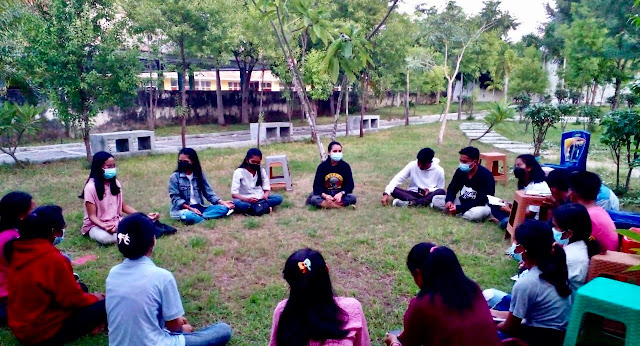Women and Sumba traditions are inseparable. One of the Sumba traditions that are still done is marriage customs, where the groom gives dowry to the bride. The dowry, commonly animals, is based on the number requested by the family. The animals were brought by the groom to show appreciation to the bride and their families. However, as time goes by with the development of technology, some people abuse the Sumba tradition and others use it to deceive and even oppress women after being given dowry. Students and women should learn about the culture correctly as early as possible.
The Multiplication Program of Stube HEMAT in Sumba which focuses on women, culture, and digital provides opportunities for students and women to learn and understand the culture and traditions of the Sumbanese people through discussion forums (17/02/2022). Students from Unkriswina and several career women joined the outdoor discussion at the Grein cafe, Sandlewood park which has a cool and relaxing atmosphere. The discussion on 'Women and the Potential of Sumba' was moderated by Mely Njurumana, SE.
Elisabeth Uru Ndaya as the multiplicator started the discussion by introducing Stube HEMAT and the importance of students and women to understand the traditions of Sumba. Mayun E. Nggaba, M.Pd, a lecturer and women-Sumba culture watch, emphasized that Sumba culture is truly unique. In the customary marriage tradition, there is dowry, and the pride of Sumba’s women is appreciated. However, as time goes, the value of Sumba marriage shifted. The misunderstanding on dowry becomes a reason why Sumbanese women are not involved in the important forums, as if they have been ‘bought’, they are only responsible for taking care of the household and following all decisions made by their men or husbands. Even though the truly Sumba culture is not like that, when a man prepares for the wedding, he consults his mother or his bride about the number of dowries. Women have an important role in livelihood both as a wife and a mother. However, sometimes women themselves narrow their views on the status of women.
The discussion became more lively when the participants shared their knowledge about women and the tradition of Sumba. Novia, one of the participants said, "We cannot say that the Sumbanese tradition oppresses women without knowing and understanding the real culture." Meanwhile, Etris, an Agribusiness student, told that when her sister was proposed to, she would not ask for a high dowry, because she did not want her sister to suffer and be oppressed. Osin Njurumana, a village midwife, shared her experience while dealing with pregnant women. She often met underage pregnant women and had children because their parents forced them to marry for dowry. When a question was asked, they were giving up on the situation for fear of being beaten by their families. The resource person responded that this kind of habit must be stopped and we as the next generation should start better from now on.
Mayun conveyed two main points: the higher the education, hopefully, we understand more about the culture, and the culture of Sumba actually does not oppress women. Through the discussion, the students and everyone involved should be sensitive to the surroundings and advocate for the oppressed-women victims. Let’s be dignified and be broad-minded women, so that, no one can underestimate the pride of a woman. ***




